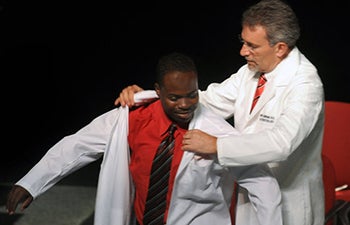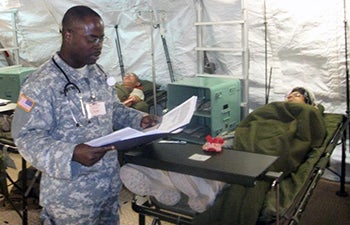
Surviving the Storm
When Hurricane Katrina struck New Orleans on Aug. 29, 2005, Morgan Hawkins was holed up in a dorm room at the city’s Xavier University where he was about to begin his sophomore year as a premed student.
“Most students had evacuated the campus, but I couldn’t do that,” Hawkins said. “I called my parents but there wasn’t any money to fly home within a day — it cost almost a thousand dollars. Coming from Los Angeles, I didn’t understand the dynamics of a hurricane. So, along with most people from the West Coast, I decided to stay on campus.”
It soon became clear that he, like most of the country, had underestimated Katrina’s wrath. “It began with a lot of banging as trees and branches hit the windows,” he said. But then the ceiling of the dorm room where Hawkins and his fellow students had taken refuge collapsed and they were forced to retreat to the hallway as windows shattered and debris began flying into the rooms.
“After the hurricane struck there was no electricity, no lights, no windows. There was no cell phone coverage so I couldn’t contact my family and they couldn’t contact me. Inside the building, it was so warm and humid, the walls were sweating. We were starting to run out of water and our only source of food was to break into the vending machines. We were surviving on chips and candy bars — all the stuff that makes you sick.
“There were hundreds of people there. That first night, we slept side-by-side, body touching body, and all of us were hot, sweaty and stinky.”
More than tough
Originally, Hawkins had thought the situation would improve rapidly. Instead it got worse.

In his first year of medical school, Morgan Hawkins is welcomed into the field of medicine at his White Coat Ceremony.
By next morning, the ground floor of the seven-level residence hall was flooded. Hawkins reckons the water was hip-deep. He and his fellow students huddled together on the upper floors. From the windows they could see they were marooned in a murky, debris-filled sea of alligator-infested floodwater. Human and animal corpses floated past, and strangers were banging on the doors trying to gain access.
“It was too dangerous to go outside, but the water kept getting higher and higher, and we were running out of food and drinking water,” he said.
Eventually the students were rescued by a Coast Guardsman who steered his boat down the water-filled streets to the residence hall and ferried them to the relative safety of a freeway on-ramp.
Still, conditions remained difficult. “People were collapsing because they were dehydrated …,” Hawkins said. “Emotionally it was very difficult. It was something I never imagined.”
After his transcripts from Xavier were lost in the floods, Hawkins spent the next year bouncing between different schools. Then Hawkins’ father — the family’s primary breadwinner — died suddenly. Hawkins’ mother went to stay with relatives, leaving him in charge of wrapping up his father’s real estate business.
“It was more than tough,” he said of that period. “I experienced a loss of hope when I returned to Los Angeles. Leaving New Orleans felt like unfinished business, and even when I started my studies again it took a long time for me to feel this is where I am supposed to be.”
New hope
Things started to look up when USC Dornsife admitted him as a transfer student. He struggled at first, “but it was an environment that forced me to learn about myself and grow, and in the end everything worked out for me at USC.”
Hawkins graduated in 2008 with a bachelor’s degree in biological sciences.
After spending the next year in a postbaccalaureate program for underrepresented minorities interested in medicine, Hawkins landed a research and laboratory technician position at USC Dornsife.
He worked there for a year before being admitted to medical school at the University of Utah in 2010. He graduated in 2014 and then spent a year doing cardiology research at the University of Utah Transplant Center. He is now a resident in internal medicine at Loma Linda Medical Center near Los Angeles. He hopes to stay in his native city and specialize in pulmonary critical care.
“I told myself 10 years ago that I would have M.D. after my name and now I do. This wasn’t the path I had planned — or wanted — to follow to get there. But I believe in God and maybe it was the way He wanted me to go. So if I had to give advice to USC students it would be: Never question the turns in your life, just make sure you reach your ultimate goal. Remember, no-one gets a prize for starting the race. To have a chance of winning you have to pass the finishing line.”
Giving back
Hawkins has not returned to New Orleans since Hurricane Katrina hit.
“For several years I felt I couldn’t handle it. That was my first college experience and there were so many memories there. Those were the streets I walked with my friends. But now I feel I have to go back.”

Morgan Hawkins at the U.S. Army training facility in Fort Sam Houston, Texas. He was promoted to Captain in August.
He is also determined to do something to help and says he would love to support minority premed students who have gone through adversity in some capacity, whether by providing encouragement or financial support.
In fact, Hawkins is already giving back. After completing his basic training in 2012 in San Antonio, Texas, he is a fully commissioned officer with the U.S. Army Medical Command. He was promoted to Captain in August and is in charge of some 300 subordinates, including emergency medical technicians, nurses and other physicians. As a reserve officer, he is called to provide medical care as needed at the site of natural disasters.
Although Hawkins no longer suffers from the nightmares that plagued him for the first six months after he moved back to Los Angeles from New Orleans, his experiences there still haunt him.
“It will always stay with me. Every time I think about New Orleans I get sick to my stomach. There are really close friends and family whom I talked to everyday when I was an undergrad there that I haven’t heard from to this day. I don’t know what happened to them. It still gives me the shivers.”
The positive side is that the huge emotional and psychological battle Hawkins had to go through during Hurricane Katrina makes every challenge he faces now seem small by comparison.
“Nothing seems to be such a big deal having gone through that,” Hawkins said. “Katrina put everything in perspective.”